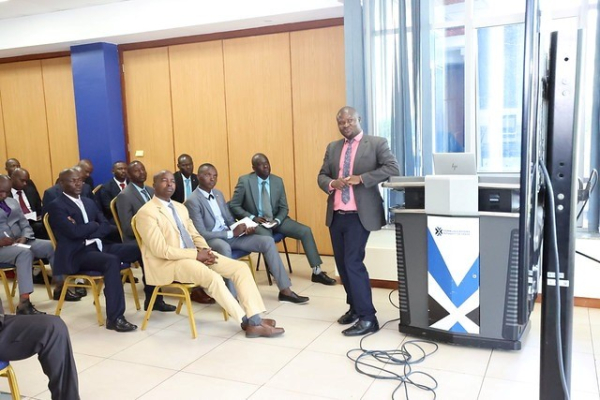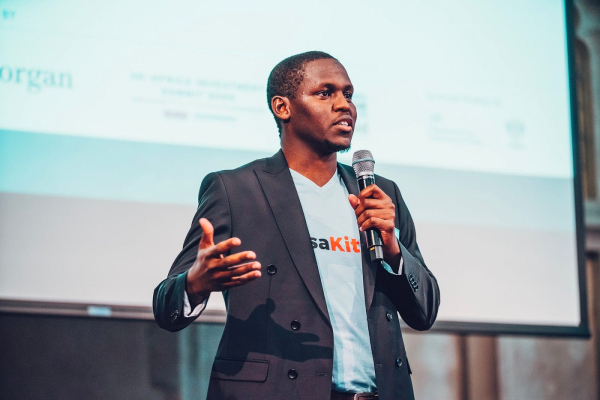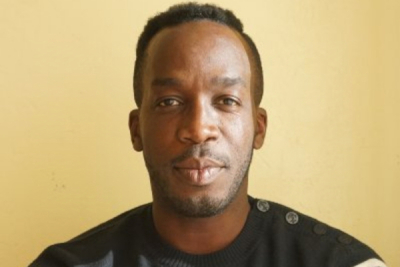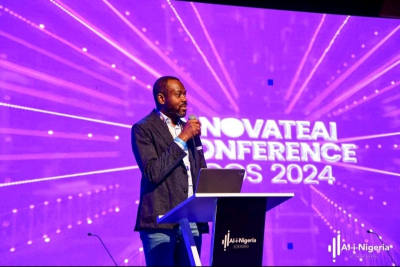The telecommunications sector is a vital driver of Africa’s digital economy. Regulating the distribution and sale of equipment fosters a competitive and well-structured market, ensuring that businesses and consumers have access to reliable, high-quality devices, which are essential for comfortable user experience and growth.
Kenya has developed a new regulatory framework to enhance the telecommunications equipment market. The Telecommunication Equipment Distributor (TED) Licence, proposed by the Communications Authority of Kenya, aims to ensure compliance with industry standards, reduce e-waste, and promote accountability among distributors and vendors in the ICT sector. Stakeholders and members of the public have until January 23rd, 2025 to review the proposals and submit their feedback.
According to the Communications Authority, “the current review aims to remove certain market barriers identified over time, in line with the Authority’s mission of enabling regulation.”
The TED Licence will be required for wholesale suppliers of communication equipment, such as importers and distributors, and foreign manufacturers who wish to distribute their products locally. Kenyan manufacturers are exempt from this requirement but must sell their equipment exclusively to licensed TEDs. Local manufacturers wishing to distribute their products directly to vendors must still obtain a TED Licence. Licence holders must obtain type approval for all low-power communication equipment they sell, ensuring compliance with standards, a minimum one-year warranty, and spare parts availability.
The Licence will involve an application fee of Kshs. 5,000, an initial licence fee of Kshs. 250,000, and an annual operating fee of Kshs. 120,000 or 0.4% of gross annual turnover, whichever is higher. A total of Kshs. 375,000 ($2,883) for the beginning. The licence will be valid for 15 years.
This regulatory framework aims to standardize the telecommunications equipment market, enhance consumer confidence in ICT products, support sustainability by curbing e-waste, and foster fair competition by clearly defining the roles of manufacturers, importers, and vendors. By implementing these measures, Kenya is taking a significant step toward creating a more accountable and efficient telecommunications equipment market while promoting a sustainable and digitally inclusive future.
The move complies with Section 24(1) of the Kenya Information and Communications Act, 1998, which provides that “No person shall operate a telecommunication system or provide any telecommunication services except per a valid Licence granted under this Act. For players like Starlink, who market their telecommunications equipment, the new requirements may introduce additional costs, potentially affecting the pricing of their antennas in the market.
Hikmatu Bilali
A serial entrepreneur, he leverages technology and innovation to develop high-impact solutions that drive African growth.
Andrew Mutua (photo) is a Kenyan computer scientist and tech entrepreneur. He is the founder and CEO of PesaKit, a fintech and e-commerce startup.
Founded in 2019, PesaKit focuses on providing financial services and digital commerce solutions for underserved communities in Africa. The company helps mobile money agents and local merchants grow and thrive by offering tools tailored to their needs.
Using artificial intelligence (AI) technologies, PesaKit has implemented innovative infrastructure to facilitate the distribution of financial, retail, and e-commerce services. By combining AI with human expertise, the startup ensures greater precision and consistency in its services, thereby improving the financial health of vulnerable populations across the African continent.
PesaKit operates in Kenya, Uganda, Tanzania, and Ghana, supporting over 50,000 mobile money agents and merchants, who in turn have enabled more than 18 million unique customers to access these services within their communities.
Before PesaKit, Andrew Mutua founded Logic IT in 2012 and served as its CEO until 2018. Logic IT is a tech design company that helps organizations create innovative products and services that people love, desire, and depend on. Its work ranges from designing mobile apps and web services to developing enterprise solutions.
Andrew Mutua holds a diploma in web design and development, 2D animation, and interactive technologies from Nairobits Digital Design School, obtained in 2009. He also earned a bachelor's degree in microprocessor technology and instrumentation from the University of Nairobi in 2013. In 2018, he attended the "Rethinking Financial Inclusion" program at Harvard Kennedy School, further strengthening his expertise in inclusive finance.
His professional career began in 2009 as a frontend and UX developer at Wunderman, a digital agency. Between 2011 and 2012, he worked as a digital media manager at BusinessIT Afrika Limited, a Kenyan IT company.
By Melchior Koba,
Editing by Sèna D. B. de Sodji
A trained computer scientist with experience at prestigious American companies, including Google, he's now an entrepreneur revolutionizing Africa's logistics sector through digital transformation.
Togolese-born Jean-Claude Homawoo (photo) is the co-founder and CEO of Lori Systems, a Kenya-based startup, which aims to transform Africa's logistics sector.
Founded in 2017, Lori Systems provides cross-border transportation services across the African continent. Through its digital platform, it connects cargo owners with reliable transporters to ensure fast and efficient delivery.
Lori Systems manages a network of over 20,000 trucks. From its offices in Nigeria, Kenya, and Uganda, the company coordinates the transportation of goods across 12 African countries. By leveraging its technology and data, it optimizes pricing and route planning to maximize efficiency. To date, the startup has facilitated the transportation of goods valued at $10 billion.
Jean-Claude Homawoo holds a bachelor’s degree in electrical and computer engineering from Drexel University in the United States and an MBA from Harvard Business School.
His professional career began in 2004 in the U.S. at Gerson Lehrman Group, where he served as head of the technology, media, and telecoms division for Asia. In 2010, he became the director of the global community of high-impact entrepreneurs at Endeavor. Two years later, in 2012, he was appointed vice president of product strategy at IROKO Partners, an African entertainment technology company.
In 2013, Jean-Claude Homawoo joined COOLS, an American advertising company, as chief operating officer. Between 2014 and 2018, he worked at Google as a product manager.
By Melchior Koba,
Editing by Sèna D. B. de Sodji
After being absent from the global Startup Ranking in 2020, Algeria has now surged into the top 20 countries with the highest concentration of young tech entrepreneurs. In Africa, the nation ranks second, trailing only Nigeria.
The Algerian government is continuing to bolster digital innovation with new fiscal incentives introduced for 2025, building on a series of measures implemented over the past five years. These include exemptions from transfer duties on property acquisitions for startups and incubators to stimulate industrial activity, as well as a two-year extension of income tax (IRG) and corporate tax exemptions for incubators, contingent on the renewal of their official designation.
The government has also introduced exemptions from registration fees for the incorporation of companies led by holders of the "innovative projects" label. To encourage research and development (R&D), the 2025 Finance Act introduces tax deductions for expenses related to in-house R&D and open innovation programs contracted with startups or incubators.
"This deduction, applicable to the determination of taxable profit, is limited to 30% of the accounting profit, with a maximum cap of 200,000,000 Dinars (€1.4 million). If expenses cover both research and development and open innovation, the deduction cannot exceed this cap," the 2025 Finance Act stipulates.
Since 2020, Algeria has positioned digital innovation as a cornerstone of its economic development strategy. Recognizing its potential to drive job creation and wealth generation, the government established a dedicated ministerial position for the knowledge economy and startups. Subsequently, the national program "Algeria Disrupt" introduced a regulatory framework fostering innovation, including provisions for certifying innovative digital enterprises.
In 2021, the Algerian Startup Fund was launched as a public financing mechanism combining investment and venture capital for high-growth innovation projects. Two years later, in 2023, the Algerian Innovation Fund was created as a collaboration between the public accelerator Algeria-Venture and the international Small Enterprise Assistance Funds (SEAF).
During a meeting between the Government and local government officials on meeting on January 19, 2023, then-Minister Yacine El Mahdi Oualid highlighted Algeria's progress, reporting over 5,000 startups registered with the ministry, including 1,100 certified as “startups” or “innovative projects.” He also noted the expansion of incubators, which grew from 14 in 2020 to 60 by 2023, covering the entire national territory.
By Muriel EDJO,
Editing by Sèna D. B. de Sodji
Africa has been making significant strides towards digital transformation, with growing adoption of mobile internet, fintech innovations, and e-commerce platforms. Internet shutdowns hinder the everyday functioning of these sectors and create a sense of instability, discouraging investments and limiting opportunities for startups and entrepreneurs.
In 2024, Sub-Saharan Africa faced significant economic losses from deliberate internet shutdowns, totaling $1.56 billion, or 20% of the global economic impact, according to Top10VPN data. These disruptions impacted 111.2 million users -17% of the global total- across 32,938 hours of downtime, severely affecting the region's digital economy.
Sub-Saharan Africa’s internet disruptions were mainly driven by conflict and political unrest. Sudan was the hardest hit, losing $1.12 billion (71.8% of the region's total loss), as internet services were shut down to control protests and suppress information. This affected 23.4 million people over 12,707 hours. Ethiopia followed with a loss of $211.2 million, while Kenya experienced a $75 million loss. Although Ethiopia incurred a higher financial loss, the Kenyan outage affected 22.7 million people over 511 hours, compared to 3.3 million in Ethiopia over 4,680 hours.
In contrast to the frequent but less economically damaging shutdowns for exams, which are common in the region, conflicts and information control were the top reasons for internet restrictions. The ongoing Sudanese conflict, along with unrest in countries like Ethiopia resulted in some of the longest and most costly shutdowns in Africa. These shutdowns caused long-term disruptions in business, access to essential services, and social media platforms, which are increasingly vital for communication and economic activity.
Social media platforms like Twitter (X) and TikTok were often blocked, reflecting governments’ efforts to control information flow during political instability. For instance, Twitter’s extended shutdown in countries like Nigeria and Sudan led to significant disruptions for citizens and businesses that use the platform for networking, marketing, and information-sharing.
Internet shutdowns in Africa have significant economic and innovation costs, especially for startups in fintech and e-commerce. As mobile technology and internet access grow, these disruptions threaten the region's digital economy. Shutdowns disrupt communication, business activities, and essential services, deepening the digital divide and hindering economic growth.
In conclusion, the economic impact of internet shutdowns in Sub-Saharan Africa in 2024 highlights the urgent need for resilient digital infrastructure, better governance, and greater advocacy for digital rights. These challenges serve as a reminder of the central role the internet plays in Africa's development and the risks posed by internet shutdowns to economic and social progress.
Hikmatu Bilali
InnovateAI Lagos 2025, the second edition of AI in Nigeria’s flagship conference, will occur on February 21, 2025, at the Landmark Event Centre in Lagos.
Under the theme “AI and the Future of Work,” the conference will examine AI’s impact on reshaping skills, recruitment, and workforce roles, focusing on innovation in key sectors such as agriculture, healthcare, education, and finance.
Speakers will include leaders from global tech firms, Nigerian banks, agritech innovators, and AI researchers addressing topics such as workforce reskilling and ethical AI development.
Visa has launched the Visa Accelerator Program, a three-month initiative to support African startups in transforming the financial landscape. The program targets seed to Series A startups with market-ready solutions addressing key challenges in FinTech.
Startups must have a minimum viable product (MVP), proven market traction, and operations in Africa or plans to expand on the continent.
Participants will gain access to Visa’s technology, mentorship, and global network to scale their innovations. Applications close on March 15, 2025.
Launched by two tech entrepreneurs, the financing solution aims to support the growth of small and medium-sized enterprises in Egypt. It recently received backing from the Egyptian Financial Regulatory Authority.
Oliv is an Egyptian digital platform that offers factoring services to small and medium-sized enterprises (SMEs). It allows businesses to instantly convert invoices into cash. Based in Cairo, the startup was founded in 2024 by Ziad Mokhtar and Hatem M. Sabry.
“Our goal is to help thousands of small businesses secure short-term financing to maintain smooth operations and support growth. We rely on technology to extract and analyze data and make financing decisions in just a few minutes.”
For the time being, Oliv can be accessed only accessed through its website, where users create accounts. Based on registration information, the fintech assigns a credit limit to the business.
To be eligible for financing, businesses must provide B2B services and have an electronic invoice history exceeding one year. Eligible invoices can then be selected for factoring, with discount rates reviewed and a digital contract signed with Oliv. Funds are deposited into the business's bank account within 48 hours.
The platform offers up to 4 million Egyptian pounds (approximately USD 79,000) and payment terms are 30, 45, or 60 days on a renewable basis.
Adoni Conrad Quenum
He is a technology entrepreneur specializing in educational technology solutions. He has received numerous awards and recognition for his innovative work.
Cecil Senna Nutakor (photo) is a Ghanaian entrepreneur leveraging technology to improve lives. He is the founder and CEO of eCampus, an edtech startup focused on making education more accessible, flexible, and affordable.
Founded in 2015, eCampus offers a digital learning platform tailored for a wide range of users—from primary school students to professionals seeking vocational training or higher education. The platform provides tools to evaluate, analyze, and predict users’ readiness for exams, employment, or compliance processes.
For students, eCampus facilitates goal-setting, preliminary testing, progress tracking, and self-paced learning. Teachers can share knowledge, mentor learners across Africa, and earn additional income while inspiring and educating. Businesses also benefit, using eCampus to train employees, monitor performance, and identify strengths to enhance growth and productivity.
Before launching eCampus, Nutakor founded Equinox Intercom Ltd in 2006, a Ghanaian application services provider where he serves as CEO. He began his career as a systems administrator at Regent University College of Science & Technology in 2005. He later worked as an IT consultant for the Ghana Ports Authority (2006), a project manager at Ghana Commercial Bank (2010), and held the same role at luxury real estate firm Devtraco Plus Ltd (2013–2015). In 2019, he collaborated with the German Agency for International Cooperation (GIZ) as an edtech consultant.
Nutakor holds a bachelor’s degree in computer science from Regent University College of Science & Technology (2007). He earned a master’s degree in international business and sustainable development from the Catholic University of the Sacred Heart in Milan, Italy (2014). Additionally, he completed a program in exponential technologies at Silicon Valley’s Singularity University in California.
He won the Startup of the Year in Education award at the Ghana Startup Awards in both 2016 and 2021, as well as the overall Startup of the Year award in 2021.
By Melchior Koba
Editing by Sèna D. B. de Sodji
Mauritanian authorities are pressing ahead with a national digital transformation strategy aimed at making technology a key driver of the country's socio-economic development.
Mauritania launched its electronic visa (e-visa) system last week. According to a statement issued by the Ministry of Foreign Affairs, from January 5 on, all travelers needing a visa should obtain it online before boarding flights to the country.
Applications must be submitted through the website of the National Agency for Population Register and Secure Titles (ANRPTS). The e-visa requirement applies to all nationalities except those with reciprocal visa waiver agreements with Mauritania, which include 18 countries, 10 of them African: Morocco, Algeria, Tunisia, Libya, Mali, Senegal, Gambia, Niger, Côte d’Ivoire, and Chad. In some cases, such as with Morocco, the exemption is limited to diplomatic and service passports.
The e-visa system aligns with the government's "National Digital Transformation Agenda 2022-2025" and is expected to simplify foreign entry, potentially boosting tourism. This supports the government's 2018-2030 National Tourism Strategy.
Mauritania's tourism sector GDP generated 1.8 billion ouguiyas ($45.05 million) in 2021 and is projected to reach 2.2 billion ouguiyas by 2025, according to an IMF report. The IMF noted the sector has "significant potential" but requires development of a tourism offering tailored to both domestic and international visitors, along with strengthened territorial security.
By Isaac K. Kassouwi,
Editing by Sèna D. B. de Sodji
More...
Egypt is set to host the Data Science and AI Conference (DSC) MENA 2025 from April 10 to 12, 2025, in Cairo, the Ministry of Communications and Information Technology (MCIT) announced on January 2, 2025.
The event will gather over 1,500 participants and 90 speakers to discuss 25 topics shaping the future of AI and data science in the region. Sessions will focus on AI advancements, societal impacts, governance frameworks, and industry applications.
The conference begins with two days of online training and tutorials, concluding with an in-person event on April 12 at Egypt University of Informatics (EUI) in Knowledge City.
Smuggled phones often bypass safety standards and lack warranty coverage, leaving consumers vulnerable to defective products. By introducing mechanisms to curb smuggling, African governments can close loopholes, improve oversight, and protect consumers.
Egypt’s Finance Ministry and the Ministry of Communications and Information Technology have jointly launched a new electronic mechanism featuring a mobile application named "Telephony" (My Phone) to tackle mobile phone smuggling and promote the localization of mobile phone manufacturing. The new system, announced on December 31, aims to ensure fair competition in the Egyptian mobile phone market, which has recently attracted several international companies to manufacture various models locally.
According to a joint statement issued by the ministries, the mechanism will allow citizens returning from abroad to bring one mobile phone for personal use exempt from fees, provided it is registered through the "Telephony" application. This exemption will be valid for three months.
The application enables users to register imported mobile phones online, inquire about and pay any applicable fees electronically. It also aims to safeguard consumers from counterfeit and smuggled devices while streamlining customs procedures.
Customs duties and taxes on imported mobile phones will remain unchanged under the new system, which takes effect on January 1, 2025. Taxes and duties on imported mobile phones have been levied at 38.5 percent. However, the statement clarified that the regulations will not be applied retroactively, ensuring that phones activated before the implementation date will not be affected.
Egypt has been facing significant issues with phone smuggling. It is estimated that around 80% of mobile phones entering Egypt in 2023 and 2024 were smuggled, according to Mohamed Shamroukh, CEO of the National Telecommunications Regulatory Authority (NTRA). This has created unfair competition for local phone manufacturers, as smuggled phones often avoid customs duties and taxes.
The introduction of the "Telephony" app reflects Egypt's broader digital transformation agenda, which aims to integrate technology into public services. By leveraging electronic registration and payment systems, the government reduces bureaucracy, streamlines processes, and enhances transparency. This aligns with Egypt's Vision 2030, which emphasizes innovation and digitalization as key pillars for development.
Hikmatu Bilali
The HealthTech Hub Africa (HTHA) is now accepting applications for its 2025 cohort, seeking African ventures with innovative solutions to improve public health systems.
Applicants will be evaluated on the impact, product reliability, team expertise, market alignment, and scalability of their solutions within public health systems.
The hub offers mentorship, funding, and platforms to scale innovations to advance digital transformation and equitable healthcare access. Applications close on January 17, 2025.
Digital transformation is a top priority for the Beninese government. To succeed, the nation is seeking the expertise of skilled professionals to drive this change and create a modern, efficient, and inclusive government.
As part of its strategy to become a regional leader in digital innovation, Benin, with the support of the European Union, seeks an expert to strengthen the development environment for digital public services. This recruitment aligns with the government's broader goal of modernizing its administration and accelerating digital transformation to benefit citizens.
"The Beninnovation project strengthens cooperation between the public administration and local private companies in the field of digital transformation, particularly in digitizing public services," states the official announcement. "To date, the main achievements in the digitizing of public services in Benin have been driven by the Agency for Information and Digital Systems (ASIN), with support from the Estonian Academy of e-Governance and advisory services provided by Cybernetica, an Estonian ICT company."
This initiative is part of a broader effort led by ASIN and financially supported by the European Union. It aims to industrialize electronic services and deliver high-performance digital solutions through a modern Platform-as-a-Service (PaaS) architecture. Key responsibilities of the expert will include designing an innovative development environment, integrating solutions to enhance interoperability and system security, and building the capacities of both public and private stakeholders. These tasks are expected to be completed over 470 days.
Through this initiative, the government seeks to address gaps in technical expertise while increasing the involvement of local businesses in digital transformation efforts. This approach is poised to strengthen Benin's position as a leader in digital innovation in West Africa.
By Samira Njoya,
Editing by Sèna D. B. de Sodji















